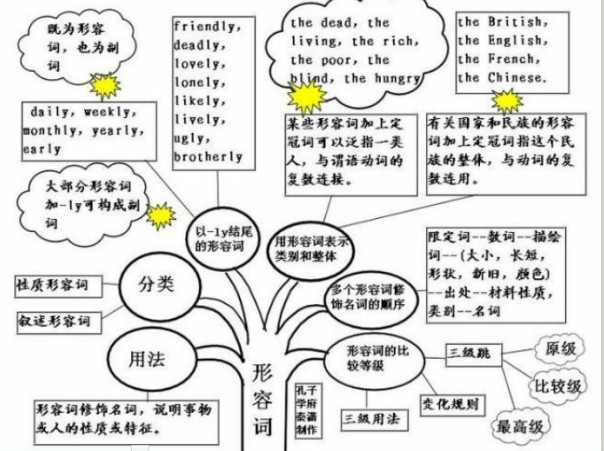本试题 “I was sleepy. I decided to make myself some ____ coffee so I could work ____ .[ ]A. weak ; better B. strong; wellC. strong;better D. weak;well” 主要考查您对形容词
副词的比较级
等考点的理解。关于这些考点您可以点击下面的选项卡查看详细档案。
- 形容词
- 副词的比较级
形容词的概念:
形容词(adjective),简称adj.或a,形容词用来修饰名词或代词,表示人或事物的性质、状态,和特征的程度好坏与否,形容词在句中作定语、表语、宾语补足语。通常,可将形容词分成性质形容词和叙述形容词两类,其位置不一定都放在名词前面。
形容词的作用与位置:
形容词是用来修饰名词的,常被放在名词前作定语,或放在系动词后面作表语。以下属几种特殊情况,须牢记;
(1)形容词短语作定语,定语后置。
如:a language difficult to master,
a leaning tower about 180 feet high
(2)表语形容词(afraid、alike、alone、asleep、awake、alive等)作定语,定语后置。如a man alive。有些表身体健康状况的形容词如well、faint、ill只作表语。sick既可作表语又可作定语,ill如作定语意为“bad”。
(3)用作定语,修饰由不定代词one、no、any、some和every构成的复合词如anything、something等时,通常后置。
如:I have something important to tell you.
(4)else常用作疑问代词和不定代词的后置定语。
(5)enough、nearby修饰名词前置或后置,程度副词一般位于形容词、副词前面,enough修饰形容词、副词时,必须后置。
(6)几个并列的形容词作定语,其语序通常为:限定语(The、A)+描绘性形容词+size(大小)+shape(形状)+age(年龄、时间)+color(颜色)+origin(国籍、来源)+material(材料)+purpose(目的)+名词。
口诀:
限定描绘大长高,形状年龄和新老;颜色国籍跟材料,作用类别往后靠。
如:a heavy black Chinese steel umbrella,
the man's first tow interesting little red French oil paintings
形容词的用法:
1、形容词修饰名词,说明事物或人的性质或特征。通常,可将形容词分成性质形容词和叙述形容词两类,其位置不一定都放在名词前面:
1)直接说明事物的性质或特征的形容词是性质形容词,它有级的变化,可以用程度副词修饰,在句中可作定语、表语和补语。例如:hot热的。
2)叙述形容词只能作表语,所以又称为表语形容词。这类形容词没有级的变化,也不可用程度副词修饰。
大多数以a开头的形容词都属于这一类。例如:
afraid害怕的。(错)Heisanillman. (对)Themanisill. (错)Sheisanafraidgirl. (对)Thegirlisafraid.
这类词还有:well,unwell,ill,faint,afraid,alike,alive,alone,asleep,awake等。
3)形容词作定语修饰名词时,要放在名词的前边。但是如果形容词修饰以-thing为字尾的词语时,要放在这些词之后。例如:somethingnice
2、用形容词表示类别和整体:
1)某些形容词加上定冠词可以泛指一类人,与谓语动词的复数连接。如:the dead,the living,the rich,the poor,the blind,the hungry The poorarelosinghope.穷人失去了希望。
2)有关国家和民族的形容词加上定冠词指这个民族的整体,与动词的复数连用。如:the British,the English,the French,the Chinese. The English have wonderful senseofhumor.
以-ly结尾的形容词:
1)大部分形容词加-ly可构成副词。但friendly,deadly,lovely,lonely,likely,lively,ugly,brotherly,仍为形容词。改错:
如:(错)She sang lovely.
(错)He spoke to me very friendly.
(对)Her singing was lovely.
(对)He spoke to me in a very friendly way.
2)有些以-ly结尾既为形容词,也为副词。 daily,weekly,monthly,yearly,early .
如:The Times is a daily paper.
The Times is published daily.
形容词知识体系:

复合形容词的构成:
(1)形容词+名词+ed:
如:kind-hearted 好心的,white-haired 白发的
(2)形容词+形容词:
如:red-hot 炽热的,dark-blue 深蓝的
(3)形容词+现在分词:
如:good-looking 好看的,easy-going 随和的
(4)副词+现在分词:
如:hard-working 勤劳的,fast-moving 快速转动的
(5)副词+过去分词:
如:hard-won 得来不易的,newly-made 新建的
(6)名词+形容词:
如:life-long 终生的,world-famous 世界闻名的
(7)名词+现在分词:
如:peace-loving 爱好和平的,fun-loving 爱开玩笑的
(8)名词+过去分词:
如:snow-covered 白雪覆盖的,hand-made 手工的
(9)数词+名词+ed:
如:four-storeyed 4层楼的,three-legged 3条腿的
(10)数词+名词(名词用单数):
如:ten-year 10年的, two-man 两人的
副词的比较级:
副词和形容词一样,也有它的比较级形式。表示两个人或事物之间的比较。用来修饰形容词、动词、其他副词或者整个句子。
副词的比较级的用法:
1)单独使用:
如:Try to do better next time.下次争取干好一点。
I had seen the film only a few days earlier. 我是几天前才看的这部电影。
He'll come back sooner or later. 他迟早会回来的。
Please speak more slowly. 请讲慢一点。
I determined not to travel farther that night. 我决定那天晚上不再往前走了。
2)和than一起使用:
如:He swims better than I do. 他游泳游得比我好。
He works less than he used to. 他工作的时间比以前少了。
Can you do any better than that? 你能不能干的好一些?
He arrived earlier than usual. 他到的比平时早。
He studied the subject further than I do. 这问题他研究得比我深。
3)比较级前可有状语修饰:
如:You must work much faster. 你必须大大加快干活的速度。
He walked no further. 他没在往前走。
She could dance even more gracefully than a dancer. 她能比舞蹈演员跳的更美。
Helen came late, but her sister came still later.海伦来晚了,而她妹妹来得更晚。
Can you come over a bit more quickly? 你能稍稍快点来吗?
as...as和notso...as结构:
1)as...as可用在肯定句中,表示“像…一样”,后面的副词要用原级:
如:She can run as fast as a deer. 她能跑的像鹿一样快。
They work as hard as you do. 他们工作像你一样努力。
I hate him as much as you do. 我像你一样恨他。
2)在否定句中,as...as和so...as都可以用:
如:I don't go there as much as I used. 我现在到那里不象过去那么多了。
Ididn't do as(so) well as I should. 我做的不如我应做的那么好。
I can't jump so(as) loudly as Bill. 我跳高不如比尔。
3)这种句子中也可以有一个表示程度的状语:
如:I don't speak half as(so) well as you. 我讲的不及你的一半好。
She can read twice as fast as he does. 她阅读的速度比他快一倍。
The substancere acts three times as fast as the other one. 这种物质的反应速度是另一种物质的三倍。
副词比较级的构成:
副词的比较级的构成与形容词的类似,有规则和不规则变化。
规则变化:
|
原级 |
比较级 |
|
hard |
harder |
|
fast |
faster |
|
early |
earlier |
|
多数副词是在前面加more构成比较级 |
more quickly |
|
more slowly | |
|
more carefully |
不规则变化:
|
原级 |
比较级 |
|
badly |
worse |
|
much |
more |
|
far |
farther |
|
further | |
|
well |
better |
|
little |
less |
比较等级用法注意事项:
1)比较的对象应当一致。
如:It's hotter in Guang zhou than Beijing.(误)
It's hotter in Guang zhou than in Beijing.(正)
A woman's heart beats faster than a man.(误)
A woman's heart beats faster than a man's.(正)
2)不能与自身相比较。应借助other或else来表达排除。
如: Beckham is more popular than any footbal lplayer in the world.(误)
Beckham is more popular than any other football player in the world(正)
Beckham is more popular than all the other football players in the world.(正)
Beckham is more popular than any football player, else in the world.(正)
Beckham is the most popular football player in the world.(正)
3)形容词和副词的比较级前可以用以下单词来修饰:much,even,far,abit,alittle,alot,still等。
如:This pair of shoes is even cheaper.
The new text book is a little thicker than the old one.
He is five years younger thanI.
4)在比较级的句子中出现“of the two”之类的结构时,比较级前也需加定冠词the。
如:He is the shorter of the two boys.
Which is the larger country, Canada or Australia?
5)“比较级+and+比较级”结构,表示“越来越……”,多音节词则要用“more+and+more+原级”。
如:A block of ice is becoming smaller and smaller.
I am more and more interested in history.
6)“the+比较级,the+比较级”结构,表示“越是……就越”。
如:The sooner, the better.(越快越好。)
The busier he is, the happier he feels.
与“I was sleepy. I decided to make myself some ____ coffee s...”考查相似的试题有:
- 短文改错。此题要求改正所给短文中的错误。对标有题号的每一行做出判断∶ 如无错误,在该行右边横线上画一个勾(√);如有错误(每...
- After the long journey, the three of them went back home,__________.[ ]A. hungry and tiredlyB. hungry and tiredC. hun...
- 根据汉语提示完成句子He (渴望)fame.
- When they arrived at the school it was raining _______ harder. A. more B. quite C. very D even
- We should do what we can to save those_________ species, for example, the tiger, an animal which was considered______...
- She has already tried her best. Please don't be to _____ about her job.[ ]A. specialB. responsibleC. unuaualD. partic...
- —_____ do you think of the party? — Wonderful. I’ve never seen _____ one. A.What; the betterB.How; a betterC.How; ...
- In a sense, no country, big or small, should object to the trend of peace and development, ______ creating trouble to...
- I thought she was African, but ______ she’s Spanish.A.besidesB.actuallyC.on the other handD.at all
- --What do you think of French?--In my opinion, French is _______ EnglishA.a subject so difficult asB.as difficult a...